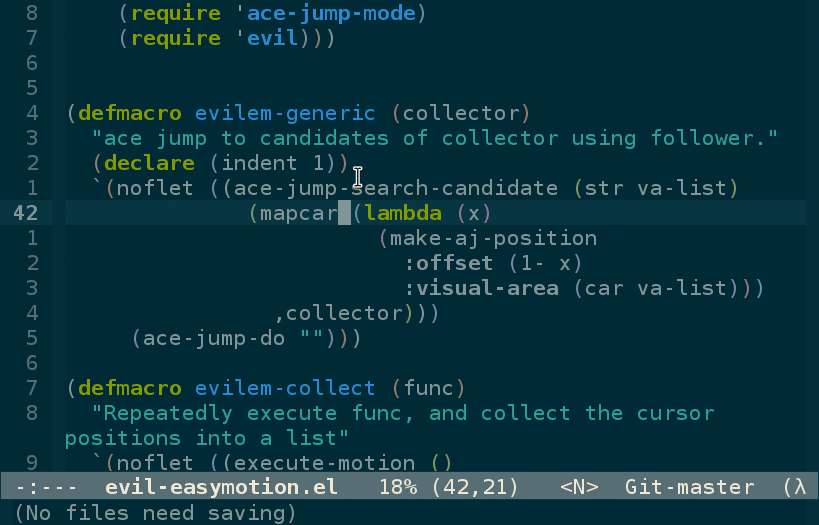PythonNut / Evil Easymotion
Labels
Projects that are alternatives of or similar to Evil Easymotion
evil-easymotion
In which we give Lokaltog/vim-easymotion a streak of malevolence.
Suppose you're a proud user of evil, but you have a nasty habit: when you want to move ten lines down, you hit j ten times in a row instead of using the ergonomically superior 10j. With evil-easymotion you can invoke SPCj, and this plugin will put a target character on every possible position. Type the character on the target and wham! you have teleported there.
Obligatory screencast
Currently most motions are supported, and it's easy to define your own easymotions. Easymotions can also be composed with operators e.g. dSPCj to delete a bunch of lines.
Notice
The evil-easymotion API has changed to use keyword arguments. The required changes (if any) to your config should be pretty self-explanatory. This should allow me to add more options in the future without breaking your config.
Basic Usage
evil-easymotion comes with predefined easymotions for all basic motions that evil defines by default, and provides key bindings for these using the standard evil keys in the built-in keymap evilem-map. To make these available for use, bind this keymap to a prefix:
(evilem-default-keybindings "SPC")
This binds all motions under the prefix SPC in evil-motion-state-map. Type SPCj to give it a try.
For motions defined manually, you need to bind the keys yourself, for instance using evilem-define:
(evilem-define (kbd "SPC w") 'evil-forward-word-begin)
(This is just an example; this functionality is already available by default.)
You can always drop by the wiki for more tips.
Building Your Own Motions
Collectors
Where present, collectors is used as the motion specification for generating jump points. It may be an (optionally sharp) quoted function name, a lambda, or a list of any of the above. If multiple functions are provided, the collected points are merged and presented at once.
Macros
evil-easymotion provides four user-facing macros:
-
(evilem-make-motion-plain name collectors &key ...)Produce a function, named
name, fromcollectors. -
(evilem-make-motion name collectors &key ...)Like
evilem-make-motion-plain, but produce an evil motion produced withevil-define-motioninstead of a plaindefun. -
(evilem-create-plain collectors &key ...)Like
evil-make-motion-plain, but with an automatically generatedname. -
(evilem-create collectors &key ...)evilem-create:evil-evilem-make-motion::evilem-create-plain:evilem-make-motion-plain -
(evilem-define key collectors)Like
evilem-create, but also bind the generated function tokeyin the relevant maps (eitherevil-normal-stateorevil-motion-state, depending on other flags).
Keyword arguments
In addition, various keyword arguments may be used to modify the behavior of the easymotion.
-
:pre-hook exprCode to run before the easymotion executes.
exprmay either be an (optionally sharp) quoted function name, a lambda, or a bare sexp, which is implictly wrapped in a lambda. -
:post-hook exprLike
:pre-hook expr, but code is run after the motion finishes. -
:bind formsA list of forms to bind around the entire easymotion.
formsmay be any bindings accepted bycl-letf*. -
:scope objectAn object to limit the scope of an easymotion.
objectmay be any thing understood bything-at-point. In practice,objectwill often be'line. -
:all-windows exprIf
expris non-nil, the motion will be executed in all visible windows simultaneously. Because evil motions do not make sense across windows,evil-define-commandis used instead ofevil-define-motionandevil-normal-state-mapis used instead ofevil-motion-state-map. -
:initial-position callableWhen specified,
(goto-char (funcall callable))is run before the motion is executed. For example, use this to jump to the BOL of each line as in easymotion with:initial-position #'point-at-bol. Unlike in:pre-hook,callableis run once per window when:all-windowsis specified. -
:push-jump exprWhen
expris non-nil, the motion will push to theeviljump list before jumping. This defaults totwhen the motion is un:scopeed. -
:collect-postprocess callableWhen specified,
callableis called on the collected list of points (which is of the form((point window)...)). Otherwise, the default function, which sorts the points in order of increasing distance from(point), is used. -
:include-invisible exprWhen
expris non-nil, the motion will not skip over invisible overlays. This may be required for motions that generate dramatically different sets of points if they are started at different locations. This defaults tonil.
Credits
I'm deeply indebted to:
-
abo-abo for authoring
avy, on which this package depends. -
Lokaltog for authoring
vim-easymotionand creating the paradigm which this package emulates.

